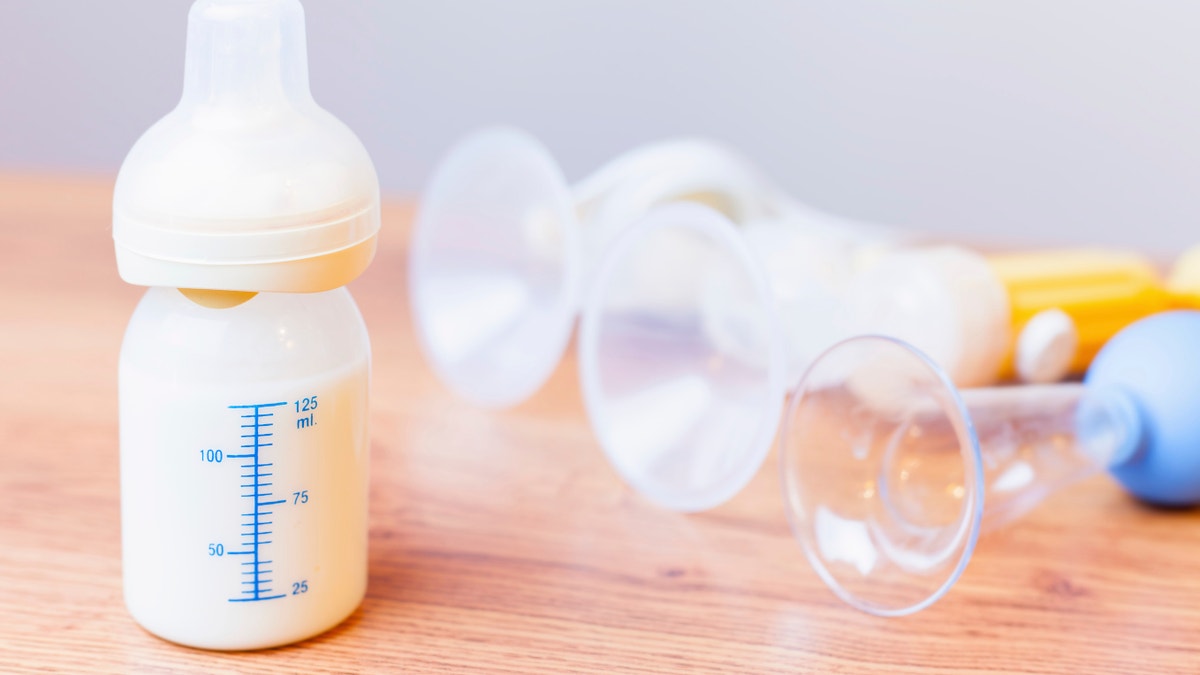
Baby bottle with milk and a measuring scale, manual breast pump, mothers breast milk is the most healthy food for newborn baby. Objects standing in a row. Selective focus (iStock)
Landon Johnson would have been five last week. Tragically he never made that birthday, or any celebration before that after passing away just days after being born.
His brave mum Jillian has struggled with sharing the details of her son’s death, fearing she would be judged. But now she has found the courage to speak out to educate other new mums.
Kidspot reports that baby Landon died after going into cardiac arrest caused by severe dehydration. The mum-of-two claims her exclusively breastfed son would still be alive today if he had just been fed a bottle.
“Did you know newborns aren’t supposed to cry all the time? They’re supposed to eat and sleep and dirty their diapers. I had no idea that he was inconsolable because he was starving — literally,” she wrote.
Jillian and her husband Jarrod did everything to prepare as first-time parents. They also booked into a ‘baby-friendly’ hospital in the US — which is geared towards breastfeeding — unless a prescription is written by a paediatrician.
On February 24, 2012, Landon was born. Jillian shares with Fed is Best that Landon was breastfed exclusively, even though he would constantly cry unless he was on the breast.
The mum was concerned about the constant feeds and crying, but was told her son was latching well and was “cluster feeding”.
One lactation consultant did mention that Jillian might have trouble producing milk because she was diagnosed with polycystic ovarian syndrome (PCOS), but no one suggested supplement feeding.
She says she trusted the doctors and nurses to help her through the first few days with a newborn, especially because she was medicated after her emergency C-section and was a first-time mum.
“But I was wrong. I’ve learned I have to be my child’s number one advocate,” she wrote in the article.
Landon nursed over nine hours during his first 24 hours of life, but after being alive just 53 hours, he had lost 9.72 per cent of his birth weight.
Jillian and her baby born were discharged less than three days after giving birth. She returned home and Landon continued to frequently breastfeed “with a mother whose milk had not come in.”
Landon was found unresponsive after eventually falling asleep from ‘cluster-feeding’.
“We took him home ... not knowing that after less than 12 hours home with us, he would have gone into cardiac arrest caused by dehydration,” Jillian wrote.
“When a baby is only on the breast, how do we gauge how much they’re actually getting out? Sure, there should be wet and soiled diapers, and weight checks, right? And where is the limit as to weight loss and a minimum for the diapers changed?
Landon was rushed to hospital, put on a ventilator and taken to the neonatal intensive care unit. Later a brain MRI confirmed a brain injury from oxygen deprivation due to low blood pressure from dehydration and cardiac arrest.
Given his poor prognosis, he was tragically taken off life support 15 days later.
Jillian is still plagued with guilt and anger over losing her baby boy. When her second child, Stella, was born she was much quieter than Landon and Jillian kept asking the nurses what was wrong with her. They replied nothing.
“It was then I realised that it wasn’t normal for a newborn to cry as much as Landon did. He was just crying out from his hunger, but I didn’t know, I should’ve known. I still struggle daily feeling as though I failed him,” she wrote.
Jillian says the best advice she was given was from one of Landon’s NICU doctors, while he was on life support, who said breast is best but follow with a bottle, ‘this way you now your baby has eaten enough’.
How much is enough milk?
• Make sure your baby eats every one to three hours and sleeps for no more than three hours between daytime feeds
• Your baby should have five to six wet disposable nappies or six to eight wet cloth nappies with urine that is a pale yellow
• A young baby should have two to four loose, grainy, mustard-colour stools per day
• You should be able to hear your baby swallowing when they’re feeding
• Check whether your baby empties each breast after feeding, you should be able to feel the breast becoming lighter and softer after a feed
• If your baby seems satisfied at the end of a feed, and generally content in between feeds, then you can feel happy that your baby is getting his or her fill.
